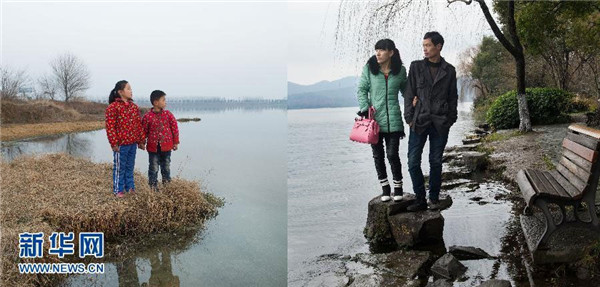
(Left) Nine-year-old Ma Shuwen and her brother stand beside a lake in their hometown in Balihe County in east China's Anhui province, Jan 11, 2015. (Right) Their parents are seen standing along the West Lake in Hangzhou, in east China's Zhejiang province on Jan 15, 2015. (Photo/xinhua)
Children of itinerant workers struggle in cities, have difficulties getting into public high schools
The structure of migrant families is more likely to cause juvenile crimes, an education report said.
"There were important links between family factors and juvenile crime. Bad family structure, an improper method of family education, and a poor family economic and cultural environment were the key factors causing delinquent minors," said the report, released by the 21st Century Education Research Institute on Monday.
It analyzed China's education reform in 2014, including migrant children's education, admission reform in elementary and middle schools, reform of the national college entrance exam and new policies to improve vocational education.
"About 36.7 percent of juvenile criminals neither go to school nor work, 27.3 percent are children who are left at home when parents work as migrant workers in cities, and 26.9 percent are children from migrant families traveling with their parents to the cities," said Zhang Liangxu, vice-director of the China Youth and Children Research Center.
Zhang and his colleague Zhao Huijie conducted a survey in a juvenile detention center. They found that 9.1 percent of juvenile criminals are children from migrant families who are left at home while parents work in the city, and 9 percent are children from migrant families moving to cities with parents.
"Children from migrant families were not able to adapt to the new environment smoothly. When children move to cities with their migrant worker parents, they need to blend into urban living quickly. However, some children move to the city at a young age, and their parents, busy with work, do not provide enough care and attention. Youth may adapt to city life blindly and in the wrong way. On the other hand, the city is not tolerant enough to cuddle these new residents, providing appropriate assistance and support," Zhang wrote in the report.
China's rapid economic development has attracted many migrant workers to cities. However, due to the strict household registration system, children from migrant families are not allowed to attend public high schools in cities. Many of them have to separate from their parents and stay at home for schooling. Some are able to be with their parents to attend primary or middle schools in cities, but due to limited high quality education resources they are not able to attend good schools.
According to the 2010 national census, 35.8 million children under the age of 18 travel with their migrant worker parents, and another 61 million children are left in rural areas when parents work in the cities.
According to the report, 20 percent of the 278.9 million children in the country were not able to enter public schools as of the end of 2013. The central government has ordered local governments to allow the children of migrant families to attend high school and take the national college exam in cities since 2012.
However, in 2014, when large cities tried to control population increases, cities such as Beijing, Shanghai and Guangzhou tightened policies allowing children from migrant families to enter urban public schools.
















































